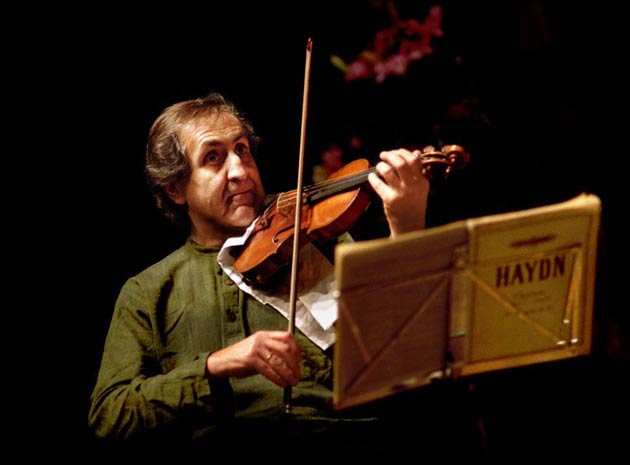Chilingirian Quartet/Hilliard Ensemble, Wigmore Hall, London<br/>OAE/Mark Padmore, Royal Festival Hall, London
Haydn's interpretation of Christ's last words and an exceptional reading of Bach's St Matthew Passion

Your support helps us to tell the story
From reproductive rights to climate change to Big Tech, The Independent is on the ground when the story is developing. Whether it's investigating the financials of Elon Musk's pro-Trump PAC or producing our latest documentary, 'The A Word', which shines a light on the American women fighting for reproductive rights, we know how important it is to parse out the facts from the messaging.
At such a critical moment in US history, we need reporters on the ground. Your donation allows us to keep sending journalists to speak to both sides of the story.
The Independent is trusted by Americans across the entire political spectrum. And unlike many other quality news outlets, we choose not to lock Americans out of our reporting and analysis with paywalls. We believe quality journalism should be available to everyone, paid for by those who can afford it.
Your support makes all the difference.Choral music dominates Holy Week, giving voice to the Passion, to pain, lamentation and joy. So Haydn's Seven Last Words from the Cross occupy a rare place in the Easter repertoire, for they are voiceless, despite the title, and it is a string quartet, in the version most often heard, that speaks, as it were, from the cross.
Like an actor playing Christ, Levon Chilingirian, leader of the Chilingirian Quartet, was sure of the profundity of his role at the Wigmore Hall on Wednesday, playing with rapt intensity the faltering syllables of the last words – the pleading Sitio ("I thirst"), the resigned Consummatum est ("It is finished"). Haydn's piece was commissioned for Cadiz cathedral, where Holy Week observances included a sequence of meditations on the last words, punctuated by music. His 1785 original, scored for a large orchestra, would have exploited the acoustic of the vast building. But between each movement would have been long periods of quiet introspection and prayer.
So it was odd, perhaps, to intersperse the austere seven Words on this occasion with the frenzied babble of nine of Gesualdo's 27 Holy Week Responsories, however wonderfully sung by the Hilliard Ensemble. Where Haydn imagines terrible events with stoicism, even decorum, Gesualdo panics and flails. He launches into a garment-rending hurly-burly of lurching tonalities, mood swings and erratic tempi, his top line swiping at Christ's burden. It's a far cry from the contemplation envisaged by Cadiz, and although the ensemble's intentions were noble, the result was confusing.
No such problems at the Royal Festival Hall on Maundy Thursday, where the Orchestra of the Age of Enlightenment and only eight singers gave a performance of Bach's St Matthew Passion that was a model of clarity and precision. From this democratic line-up – no conductor, no need – came a reading that was both studied and spontaneous, born of a unity of purpose, an urgent narrative, and the terrible momentum of an unjust act that spirals to its terrible conclusion.
The soloists put in the chorus parts too, gasping their questions: "Wen?", "Wie?", "Was?", "Wohin?", in the opening, bidding chorus, consoling in the chorales, savage in choosing for release the robber Barabbas. In the arias, the commitment was personal: Roderick Williams, warm, wronged and ultimately serene as Christ, Christianne Stotijn elegiac in "So ist mein Jesus nun gefangen", and Laura Mitchell singing on with composure when what sounded like gunfire shook the building and the nerves of performers and audience alike. (It proved to be a wheelchair tyre bursting.)
But it was the astonishing Mark Padmore, whose every performance as the Evangelist seems to exceed the one before, who propelled the piece to a different spiritual plane. Intense, almost disembodied from his task, he narrated the familiar story with a wonder, reverence and urgency that held the audience spellbound, transported by the sheer beauty of his sound. His plangent "und fing an zu trauen" ("and He began to be sorrowful"), floating "Ich will bei meinum Jesu wachen" ("I would beside my Lord be watching") and meaningful "Aber Jesus schwieg stille"("But Jesus held his peace") were profoundly moving.
The OAE, led by Margaret Faultless, played with customary vigour and distinction, and in total unity with the singers – themselves effectively an extension of the orchestra's wind section. When applause finally broke out after a long silence, all the 40 or so participants lined up in random order to take their bows, a violinist here, an Evangelist there. For this remarkable ensemble, it's all about the music. You can listen again on Radio 3.
More Haydn, Bach, Padmore, OAE, and many others at The Proms, unveiled on Wednesday. Despite the Goldie/Bollywood headlines, the 100-ticketed events have Haydn, Handel, Purcell and Mendelssohn at their core, rich seams of Tchaikovsky (Stephen Hough playing all the piano concertos), Stravinsky (all the ballet scores) and new commissions. And all for a fiver a night. Miracles do happen.
Anna Picard is away
Join our commenting forum
Join thought-provoking conversations, follow other Independent readers and see their replies
Comments